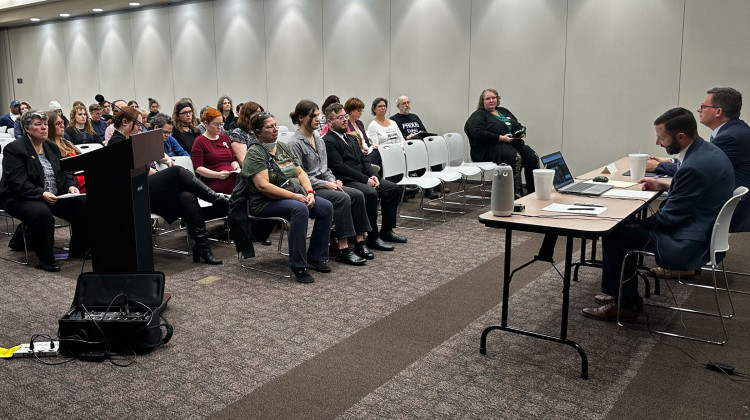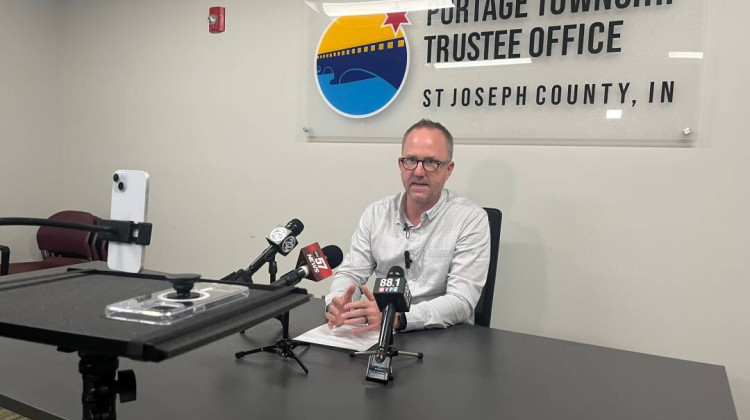People adopted between 1941 and 1993 have only had hit-and-miss opportunities to find out more about themselves and their biological families. A bill before the Indiana Senate would open access to over a half-century of adoption records, giving adoptees a much better chance of finding out about their biological roots.
Hoosier adoption records were sealed back in 1941. In the early 1990s, the legislature took action to open records starting with those born in 1994. Those adoptees are now turning 21. All adoptees can register with the state at the age of 21 requesting access to their records but those in the 52-year gap only get identifying birth records if a birth parent has consented. The rest are out of luck. Such is the case with 36-year-old Paul Pitts – born March 23, 1978.
“I was born in Indiana. Lake County area. That’s what I know. What I’ve been told was in East Chicago. St. Catherine’s is what I’ve been told," Pitts said. "What I’ve learned lately is got switched to St. Margaret’s in Hammond. I was told that I was adopted at six months. My birth name was Paulino Santos Guerrero and it was changed to Paul Anthony Pitts.”
Pitts joined the Marines out of high school and began his search when he got out.
“In 2003 and 2004 I started searching because – questions you just want to know do I have other family out there? Other brothers and sisters or aunts and uncles? Medical reasons, you know. It’s not fun always going to the hospital and you’re always like, “I don’t know, don’t know, don’t know," he chuckled. "And then, you’re like, whatever. Nothings gonna happen - until that day – stuff starts happening. Now you need answers.”
His birth mom has a fairly common name so the Internet has not been much help and because she hasn’t registered with the state, he has made very little progress in the last dozen years.
“It was like a back-and-forth thing. I would start and I would…whatever. And start again. Get a little information and then get to a dead end and stop," Pitts said."Fighting with the state is never fun because you get the same information back and forth, you know. And trying to find the original birth certificate you find out they destroyed it. Why would you destroy it? That’s not fair.”
Pam Kroskie says there are many Paul Pitts out there. She is president of Indiana HEAR – Hoosiers for Equal Access To Records. It’s a lobbying organization set up to help get Senate Bill 352 through the General Assembly.
“Adoptees that were born prior to 1941 or after January 1st, 1994 – they are able to access their identifying information and their original birth certificate. So, what we are doing is evening that out. So, adoptees ’41 and ’93 would have the same rights,” she said.
Kroskie said the state would give the adoptees paperwork to send to the courts or adoption agencies calling for the release of records.
“Each one of those places will then mail back to the adoptee – what they have on file. So, you know, you can learn about allergies and things that might not have been passed on. Or you may learn, obviously, height, weight. You actually see if you were a single birth,” she said.
Kroskie is an adoptee herself. In the late 1980s, without the help of the Internet, she was able to find her birth mom.
“I was staying at home at that point. I’d just had my first son and started searching. It took me about 10 months and I found her. You know, it was a long drawn out process. I had some small amounts of information and which helped. So, I went that route and found my mother and two sisters,” she said.
Kroskie said her reunion was a positive one and she feels lucky she had many good years before her mom died of breast cancer. Having that medical information has also empowered her to better monitor her own health. Senate Bill 352 has already overwhelmingly passed the Senate and awaits action in the Indiana House.
 DONATE
DONATE







 View More Articles
View More Articles

 Support WFYI. We can't do it without you.
Support WFYI. We can't do it without you.